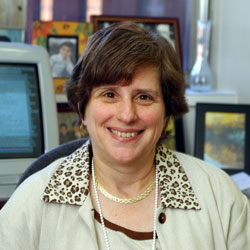| |
| |
| Ellen Leibenluft, M.D., Investigator |
 |
Dr. Leibenluft received her B.A. from Yale University in 1974 and an M.D. from Stanford University in 1978. She completed residency training in psychiatry at Georgetown University Hospital. After serving as Director of Hospital Services in the Department of Psychiatry there, she moved to the NIMH in 1989 to work with Tom Wehr on the pathophysiology and treatment of bipolar disorder. The focus of her work was rapid-cycling bipolar disorder, with a particular interest in the role that the sleep-wake cycle and circadian rhythms play in the pathophysiology of the illness. In 2001 she received a Distinguished Psychiatrist Award from the American Psychiatric Association. Dr. Leibenluft�s laboratory investigates the neurophysiology, phenomenology, and treatment of bipolar disorder in children and adolescents.
|

|
Staff:
- Robinder Bhangoo, M.D., Clinical Fellow bhangoor@intra.nimh.nih.gov
- Tara Harrison, Research Assistant HARRISOT@intra.nimh.nih.gov
- Neethu Koshy, M.D., Student koshyn@intra.nimh.nih.gov
- Catherine Holly Lowe, M.A., Patient Coordinator hlowe@mail.nih.gov
- Thalia Margalit, B.A., Research Assistant margalit@intra.nimh.nih.gov
- Fran Myers, R.N., Nurse fmyers@mail.nih.gov
- Rupa Puri, B.A., Research Assistant PuriR@intra.nimh.nih.gov
- Kenneth Towbin, M.D., Staff Clinician towbink@intra.nimh.nih.gov
- jeff villaluz, M.D., Student villaluj@intra.nimh.nih.gov
Research Interests:
The Unit conducts clinical research on bipolar disorder (BPD) and related psychiatric illnesses in children and adolescents. On a clinical level, important questions exist regarding the presentation and course of BPD in youth. To address these questions, the Unit conducts phenomenological and longitudinal studies involving children with classic presentations of BPD, as well as children with severe mood and behavioral dysregulation (characterized by chronic irritability, mood lability, and hyperarousal). Ongoing and planned clinical trials focus on treatment-resistant illness in children with BPD; the safety and efficacy of combined stimulant and mood stabilizer treatment in children with comorbid BPD and attention deficit hyperactivity disorder (ADHD); and the treatment of children with the dysregulation syndrome described above.
In addition to addressing clinical and therapeutic questions, all of the Unit�s protocols use psychophysiological, neuroimaging (structural and functional MRI, magnetic resonance spectroscopy (MRS)), and/or neuropsychological techniques to probe the neural circuitry underlying the children�s symptoms. Specifically, psychophysiological paradigms are used to test the hypothesis that, compared to controls, children with BPD have increased reactivity to emotional stimuli, and fMRI studies will compare neural activation in patients vs. controls on tasks involving the processing of aversive and appetitive stimuli. MRS will be used to test the hypothesis that lithium has neurotrophic/neuroprotective effects in these populations.
Finally, since children with BPD often have positive family histories for the illness, the Unit collaborates actively with investigators working in the field of bipolar genetics. A particular area of interest is the association between genotype and treatment response.
|
Clinical Protocols:
-
The phenomenology and neurophysiology of affective dysregulation in children and adolescents with bipolar disorder (
00-M-0198 )
Selected Recent Publications:
Calderoni D, Wudarsky M, Bhangoo R, Dell ML, Nicolson R, Hamberger SD, Gochman P, Lenane M, Rapoport JL, Leibenluft E (2001) Differentiating childhood-onset schizophrenia from psychotic mood disorders, Journal of the American Academy of Child and Adolescent Psychiatry 40, 1190-6.
National Institute of Mental Health (2001) National Institute of Mental Health research roundtable on prepubertal bipolar disorder, Journal of the American Academy of Child and Adolescent Psychiatry 40, 871-8.
Contact Information:
Dr. Ellen Leibenluft
Affective Disorders Unit
Mood and Anxiety Disorders Program, NIMH
Building 10, Room 4N-208
10 Center Drive MSC 1255
Bethesda, 20892-1255
Telephone: (301) 496-9435 (office),
(301) 402-8497 (fax)
Email: LEIBS@MAIL.NIH.GOV
|
|















